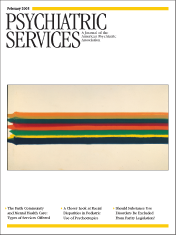Relationship Between Use of Psychiatric Services and Five-Year Alcohol and Drug Treatment Outcomes
Abstract
OBJECTIVE: The objective of this study was to examine the relationship between use of psychiatric services and alcohol and drug treatment outcomes five years after such treatment. It was anticipated that receipt of psychiatric services would predict long-term abstinence. METHODS: A sample of 604 outpatients from a managed care organization's chemical dependency program was interviewed about substance use and severity of psychiatric symptoms at baseline and at five years. Patients were required to have at least three years of membership in the health plan during the five years after intake. Severity of psychiatric symptoms was categorized as zero, low, middle, or high. Use of psychiatric services was ascertained on the basis of administrative data from the health plan. Logistic regression analysis was used to assess the relationship between receipt of psychiatric services during the five years after intake and abstinence at five years. Results were adjusted for individual, treatment, and extra-treatment characteristics; severity of psychiatric symptoms at baseline; and other contacts with the health system. RESULTS: Patients who received a threshold level of psychiatric services (an average of at least 2.1 hours a year) were significantly more likely to be abstinent at five years than patients who received less than 2.1 hours a year. CONCLUSIONS: The use of psychiatric services among patients with chemical dependency is associated with enhanced long-term outcomes.



